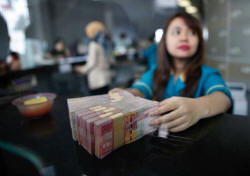|
Bond rout hits Italy,
U.S. yield surge hammers emerging markets
 Send a link to a friend
Send a link to a friend
 [November 11, 2016]
By Jamie McGeever [November 11, 2016]
By Jamie McGeever
LONDON
(Reuters) - The global bond market rout continued on Friday, driving up
Italian yields and hammering emerging markets as investors feared higher
U.S. interest rates under incoming President Donald Trump will spark
capital outflows from these assets.
With the U.S. Treasury market closed for Veterans' Day, the bond selling
centered on Europe, with Italy's benchmark 10-year yield rising to its
highest in a year before a key ratings review from Standard & Poor's
later in the day.
This followed a wave of heavy selling across emerging Asian stocks,
bonds and currencies as investors bet that Trump's fiscal policies will
be inflationary, push U.S. rates up and drive investors into
dollar-based assets.
This prompted the central banks of Malaysia and Indonesia to intervene
in the foreign exchange market to try to stem the outflow of money,
while Mexico's peso slumped to a fresh record low in its biggest weekly
slide since 2008.
Developed market equities held up better, although Europe's index of 300
leading shares was down slightly and U.S. futures pointed to a slightly
lower open on Wall Street <ESc1> <DJc1>.

Rising expectations that Trump's economic policies will include a heavy
dose of infrastructure spending sent copper soaring more than 5 percent,
on track for its biggest weekly rise since the late 1970s.
"We are turning more cautious on emerging market credit. Potential Trump
policies may translate into higher U.S. rates due to inflationary
pressures," Citi analysts said in a note on Friday. "Emerging market FX
is now joining the Trump slump."
MSCI's emerging market <.MSCIEF> index fell 2.3 percent to its lowest
level since July, chalking up its third consecutive weekly decline,
while MSCI's broadest index of Asia-Pacific shares outside Japan
<.MIAPJ0000PUS> fell 1.6 percent.
Japan's Nikkei <.N225> bucked the trend, closing 0.2 percent higher
despite a stronger yen, after earlier hitting a 6-1/2-month high.
Europe's FTSEurofirst 300 was down 0.1 percent and Germany's DAX <.GDAXI>
was up 0.5 percent, while Britain's FTSE 100 <.FTSE> bore the brunt of a
rise in sterling above $1.26 <GBP=> and fell 1.1 percent.
U.S. futures pointed to a fall of around 0.3 percent at the open on Wall
Street <ESc1> DJc1> as investors prepared to take some chips off the
table after the Dow Jones hit a record high on Thursday <.DJI>. The Dow
remains well on track for its best week in five years.
DOLLAR BUOYANT
Among the biggest fallers in Asia were Indonesian shares, which slumped
3 percent while the rupiah currency fell more than 2.5 percent to
4-1/2-month lows before it stabilized on the Indonesian central bank's
intervention.
The Malaysian ringgit also dropped 1 percent to 9 1/2-month lows, and
Mexico's peso fell nearly 3 percent to a new record low of 21.39 per
dollar.
It's been a bruising week for the peso. It has fallen 10 percent - its
worst week since 2008 and second worst since the 1995 "Tequila" crisis -
as investors have taken fright at what a Trump presidency will mean for
the Mexican economy.
[to top of second column] |

A teller at a money changer handles Indonesia rupiah bank notes in
Jakarta, Indonesia November 11, 2016. REUTERS/Darren Whiteside

Elsewhere in currencies, the dollar edged down from near 3-1/2-month
highs against the yen to 106.50 yen, and the euro was a touch weaker at
$1.0870.
But more broadly, the dollar is having its best week in a year, rising
1.7 percent against a basket of currencies, lifted by the rise in U.S.
yields and expectations of tighter policy from the Federal Reserve next
year and beyond.
The 10-year Treasury yield has this week hit its highest level in 10
months at 2.15 percent, and the 30-year yield a 10-month high of 2.96
percent .
The 30-year yield rose 38 basis points this week, its biggest weekly
jump since 2009. Markets are betting that Trump's policy stance - from
protectionism and fiscal expansion - will boost inflation.
Inflation expectations measured by U.S. inflation-linked bonds rose to
1.87 percent, its highest since July last year, up from low below 1.2
percent touched in February.
"Sharply higher bond yields are often associated with higher implied
inflation expectations, and the Fed might feel the need to respond to
this with rate hikes, not delay," said Steve Barrow, head of G10
strategy at Standard Bank in London.
In a remarkable shift of sentiment, the market is also now starting to
price in a chance of a rate hike by the European Central Bank for the
first time since 2011.
Italian bond yields rose ahead of a key ratings review and a planned
sale of Italian government bonds via auctions. The country's benchmark
10-year bond yield rose as high as 1.95 percent. Investors are also
concerned that Prime Minister Matteo Renzi may resign if he loses the
Dec 4 referendum on constitutional reform he pushed for.

Elsewhere, copper topped $6,000 per tonne for the first time since June
last year. It is up 18 percent this week, its biggest weekly rise in
over 30 years.
U.S. crude oil futures fell 1.3 percent to $44.07 per barrel and
Brent fell 1.1 percent to $45.32.
(Editing by Hugh Lawson)
[© 2016 Thomson Reuters. All rights
reserved.] Copyright 2016 Reuters. All rights reserved. This material may not be published,
broadcast, rewritten or redistributed. |